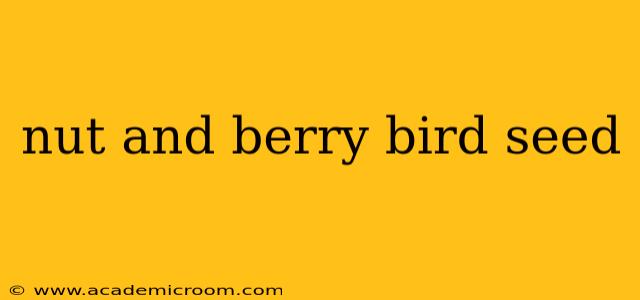Attracting a vibrant array of birds to your backyard is a rewarding experience, and offering a diverse diet is key to their success. Nut and berry bird seed blends are becoming increasingly popular, providing a nutritious and enticing food source for many species. This comprehensive guide will delve into the benefits, composition, and best practices for using nut and berry bird seed to create a thriving bird sanctuary in your own garden.
What are the Benefits of Nut and Berry Bird Seed?
Nut and berry bird seed blends offer a significant advantage over standard seed mixes. Their richness in fats, oils, and carbohydrates provides birds with the energy they need, especially during colder months or periods of breeding. The inclusion of nuts and berries caters to a wider range of bird species, attracting birds that might shy away from simpler seed mixes. This diversity enhances the biodiversity of your backyard ecosystem.
Nuts, such as peanuts, sunflower seeds (technically a seed but often categorized with nuts), and even chopped walnuts, supply essential fats and protein. Berries, on the other hand, offer vitamins, minerals, and antioxidants, adding crucial nutrients to a bird's diet. This combination creates a complete and balanced food source.
What Birds are Attracted to Nut and Berry Bird Seed?
The specific birds attracted will depend on your geographical location and the exact composition of the blend, but many species enjoy this type of food. You're likely to see:
- Woodpeckers: These birds love nuts and will happily visit your feeders.
- Jays: Known for their intelligence and adaptability, jays readily consume nuts and berries.
- Robins: While they primarily eat insects, robins will supplement their diet with berries.
- Thrushes: Various thrush species appreciate berries as a significant part of their diet.
- Finches: Some finches will happily eat the seeds mixed in with the nuts and berries.
What is Typically Included in a Nut and Berry Bird Seed Mix?
Commercial nut and berry mixes vary, but you can generally expect to find:
- Sunflower Seeds: A staple in most birdseed blends, providing high energy.
- Peanuts (in-shell or shelled): A rich source of protein and fat, particularly appealing to larger birds.
- Dried Berries: Cranberries, raisins, and other dried fruits add sweetness and essential nutrients.
- Safflower Seeds: A preferred food for certain birds, offering a different nutritional profile.
- Milo: A type of grain that provides carbohydrates.
- Corn: Another source of carbohydrates, especially favored by ground-feeding birds.
Is Nut and Berry Bird Seed Good for All Birds?
While nut and berry blends are excellent for many species, it's important to remember that not all birds benefit from the same diet. Smaller birds might struggle to crack open large nuts. It's always a good idea to offer a variety of food options to cater to diverse preferences and dietary needs.
How Often Should I Refill My Nut and Berry Bird Feeder?
Regular refilling is crucial to maintain a consistent food supply and avoid attracting unwanted pests. Check your feeder frequently, especially during periods of cold weather or when you notice it's being consumed rapidly. Aim to refill before the feeder is completely empty.
Can Nut and Berry Bird Seed Go Bad?
Yes, nut and berry birdseed can spoil. Exposure to moisture, heat, and sunlight can degrade the quality and even cause mold growth, potentially harming the birds. Store unused seed in a cool, dry place in an airtight container. Discard any seed that shows signs of spoilage, such as mold or rancid smell.
What are the Best Types of Bird Feeders for Nut and Berry Seed?
Different feeders are better suited for different types of seed. For nuts and berries, consider:
- Platform feeders: Provide ample space for larger birds to access the food easily.
- Suet feeders: Suet is a high-energy food often mixed with nuts and berries.
- Tube feeders with larger ports: Allow birds of various sizes access to the seed.
By offering a high-quality nut and berry bird seed blend and providing appropriate feeders, you can greatly enhance the variety and number of birds visiting your yard, creating a vibrant and enriching natural environment right at your doorstep. Remember to always prioritize the health and well-being of the birds by providing fresh, clean food and regularly cleaning your feeders to prevent the spread of disease.
